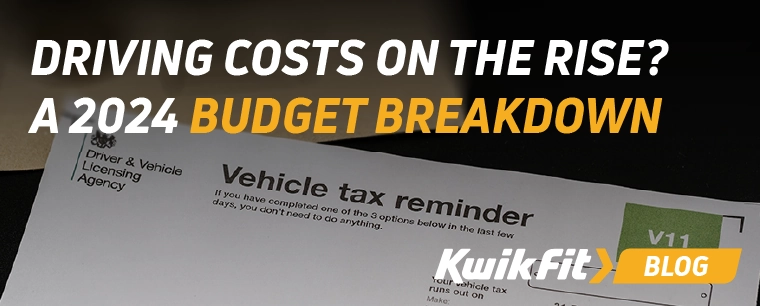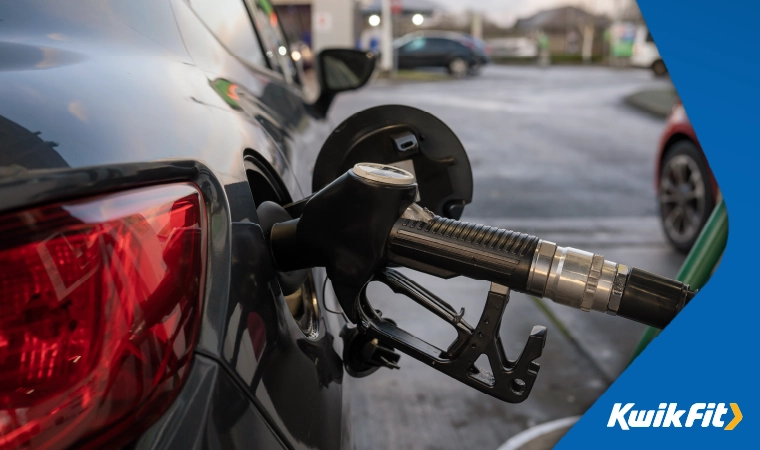Driving Costs on the Rise? A 2024 Budget Breakdown
Jack Dreyer | Thursday 5th September 2024 12:00pm

On the 30th of October 2024, the UK Government will announce their 2024 Autumn Budget. In this announcement, the Government will outline their financial priorities and policy plans for the year to come, a decision that will impact everyone from students and farmers to drivers and doctors.
There are expected to be several core changes announced that will directly impact drivers. The most notable changes expected include an increase in fuel duty and an introduction of road pricing or ‘the pay-per-mile tax’.
In this blog, Kwik Fit’s experts break down the potential impact of the Budget announcement on motorists and offer some practical advice on how to manage any associated rising costs.
If you’re a driver who wants to keep a close eye on the pennies and the pounds in the coming months, read on to stay informed.
Breaking down the Budget for motorists
While nothing is set in stone until the announcement is made by The Chancellor, Rachel Reeves, on the 30th of October, it is expected that the Budget will increase costs for motorists.
Let’s take a look at some of the core changes expected to be announced.
1. Pay-per-mile tax
The first idea under discussion is the introduction of ‘road pricing’. Under this system, motorists who drive the most miles pay the most tax. This will be an additional charge for motorists who already have to pay to drive in restricted areas such as ULEZ (Ultra Low Emission Zones), LEZ (Low Emission Zones) or CAZs (Clean Air Zones).
As the standard VED (Vehicle Excise Duty, AKA ‘Road Tax’) brings in less and less each year on account of more drivers switching to electric vehicles, the proposed pay-per-mile tax is seen as an alternative. That being said, electric vehicle owners will have to pay car tax from April 2025.
Unlike the VED, the pay-per-mile tax is not a blanket fee payable by all drivers. While, again, nothing is for certain yet, this tax could only be introduced for the busiest sections of certain roads at peak times. As such, this would tax drivers with high mileage and those who travel to work during rush hour.
We’ll wait to hear more at the end of October to see what’s announced.
2. Removing the discount on fuel duty
It is also rumoured that the 5p per litre discount on fuel duty (introduced by then-Chancellor Rishi Sunak in 2022) may be reversed. According to What Car, that would increase the fuel tax rate back up to 58p per litre, with knock-on implications for the cost of a litre of:
- Petrol: up to 145.61p
- Diesel: up to 150.35p
When considering the UK’s average driving distance of 7,400 miles per year (Car Analytics), the reversal of the discount would increase the yearly cost to run a petrol car by £43 and a diesel by £39.
According to a think tank study by the Social Market Foundation, the fuel discount — alongside the fuel duty freeze (in place since 2011) — has cost the Treasury £100bn since 2011. Taking that into account, a motive for reversing this discount becomes clear.
Ahead of the Autumn Budget, the AA has advised that the fuel duty should remain frozen while “global prices remain volatile”, describing the negative impact of rising fuel prices on households during a cost of living crisis. To illustrate the public’s concern, the AA also carried out a survey which found that 55% of 11,000 respondents worried about fuel prices.

Worrying about rising driving costs?
While the taxes levied on products like fuel are largely out of our control, there are a number of practical things that motorists can do in the face of rising fuel prices to keep costs low.
We’ve put together a number of expert guides to advise motorists on how they can save on fuel and wider driving expenses. Below we’ve aggregated our top 15 tips, under which you can find a library of our fuel-saving guides to browse though.
15 tips to keep driving costs low
Fuel saving tips
1. Car share where possible. If you make regular trips the same way as colleagues, friends, or family members, why not all hop in together to reduce multiple vehicles using fuel on the same trip?
2. Check for the cheapest fuel. Utilise fuel comparison apps or websites like Petrol Prices to find the lowest fuel prices in your area.
3. Plan ahead for the most efficient route. Idling in traffic jams is an inefficient use of fuel. So, get ahead of the game and cut the queues by using apps like Google Maps or Waze to find the shortest or least congested routes.
4. Utilise loyalty programs. Many petrol stations, especially supermarkets, offer loyalty schemes that provide discounts on fuel and other services, which can add up over time, saving you money on your shopping too.
5. Remove unnecessary weight from your vehicle. Driving around with unnecessary luggage and miscellaneous objects in your car is not fuel efficient. Lighten the load to take some of the strain off your car.
6. Streamline your vehicle. Remove roof racks & bike racks. The less aerodynamic your vehicle is, the more fuel it uses. So, reduce the wind resistance by only using attachments like roof racks when you need them.
7. Keep your tyres inflated properly. Underinflated tyres increase friction between your car and the road surface. Ensuring your tyres are correctly inflated is a surefire way to reduce drag and improve fuel efficiency.
8. Drive at moderate speeds. When driving, avoid rapid acceleration and sudden braking as both are actions that require more fuel than steady, smooth driving.
9. Rely on cruise control where possible. When it is safe to do so, such as on a motorway, use cruise control to help you maintain a steady speed and reduce fuel consumption.
10. Reduce air conditioning use. Having the air conditioning on full all the time naturally is a drain on fuel. So, unless it’s a real scorcher of a day, consider cracking the windows open a little instead to save on fuel.
General cost-saving tips
11. Shop around for insurance. Regularly review your insurance policy to make sure you’re getting the best deal possible.
12. Keep up with vehicle maintenance to avoid unexpected large costs. Getting your car serviced regularly will help keep on top of routine maintenance tasks that could otherwise cause unexpected issues if undetected, saving you money in the long run.
13. Adapt your driving style to reduce wear and tear. Get into the habit of braking less suddenly to reduce strain and use eco-driving modes if your vehicle has them.
14. Buy quality parts. While this may cost you more upfront, in the long run, quality parts (usually of an Original Equipment standard) are far more durable and longer lasting than cheap or second-hand alternatives.
15. Consider downgrading your car. As a final option, if you don’t need a large or particularly powerful vehicle consider getting a smaller more fuel-efficient car that’s cheaper to run.
Kwik Fit’s library of cost-saving advice
Use the resources below to discover more expert money-saving advice when it comes to cutting back on fuel and driving costs.
- 8 Ways to Improve the Fuel Efficiency of Your Car
- 11 Easy Ways to Save Fuel
- How to Spend Less Money on Fuel
- Fuel Efficient Tyres Can Save You Money
- How Much Fuel Does Air Conditioning Use?
For more expert guidance, head over to the Kwik Fit blog. Or, if you’ve got a question, contact us directly and ask. We’d be more than happy to help. In the meantime, book your vehicle in for that well-needed service at your local Kwik Fit centre and spot any issues before they develop into costly problems today!
Any facts, figures and prices shown in our blog articles are correct at time of publication.
Featured Articles
Is it Illegal to Drive With One Headlight?
Saturday 19th July 2025
Wondering if it’s illegal to drive with one headlight? Learn about the safety risks and penalties of illegal blown bulbs and why you should fix them promptly.
Air Con in EVs & Hybrids: Experts Answer Your Questions
Monday 30th June 2025
Does air con drain EV batteries? Can you use the air con while charging an electric car? Find out the answers to these questions & more from Kwik Fit’s experts.
Why Is Your Car Making a Noise? Fixes & Tips
Friday 13th June 2025
When your car starts making unexpected noises, it can certainly be quite disconcerting; it may be nothing to worry about, but here’s what you need to know.









